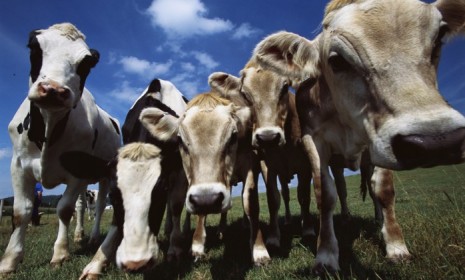Are cloned animals safe to eat?
British regulators say food from cloned livestock is not dangerous. But is it ethical?

A free daily email with the biggest news stories of the day – and the best features from TheWeek.com
You are now subscribed
Your newsletter sign-up was successful
The British Food Standards Agency has rekindled a bitter debate over cloning livestock by declaring that milk and meat from the unconventionally bred animals is "unlikely to present any food safety risk." The move came three years after the U.S. Food and Drug Administration said food from cloned animals and their offspring was safe. But the European Commission has proposed an outright ban on such food. Is it really safe—or ethical—to eat these animals? (Watch an AP report about eating cloned animals)
Cloning livestock is immoral: It is "too early to tell" whether cloned meat will hurt our health over the long term, says Peter Stevenson of Compassion in World Farming, as quoted in Britain's Telegraph. But breeding the animals is clearly unethical, as many clones die young "from heart failure, breathing difficulties, and defective immune systems."
"Campaigners' horror at cloned food on supermarket shelves"
The Week
Escape your echo chamber. Get the facts behind the news, plus analysis from multiple perspectives.

Sign up for The Week's Free Newsletters
From our morning news briefing to a weekly Good News Newsletter, get the best of The Week delivered directly to your inbox.
From our morning news briefing to a weekly Good News Newsletter, get the best of The Week delivered directly to your inbox.
There is nothing wrong with providing more food: As long as there is nothing genetically wrong with cloned food, say the editors of Food and Drink Digital, and it "tastes great," what's not to like? It's silly to claim food cloning is unethical, when it could be "the answer to world hunger." If cloning animals ensures there is "enough food to go around," it would be wrong not to give it a try.
"Good News! Cloned meat and milk have now been deemed safe for eating"
Safe or not, people will be suspicious: The Food Standards Agency's declaration was no doubt "music to the ears of British supermarkets" searching for cheap burgers to sell, says Mof Gimmers at Bitter Wallet. But when genetically modified produce got the green light, consumers eyed it "like it was Frankenstein's monster." And meat and milk from cloned animals and their offspring might taste horrible, so it's anybody's guess whether people will actually buy it.
"We're all going to be eating cloned meat soon"
A free daily email with the biggest news stories of the day – and the best features from TheWeek.com
-
 The ‘ravenous’ demand for Cornish minerals
The ‘ravenous’ demand for Cornish mineralsUnder the Radar Growing need for critical minerals to power tech has intensified ‘appetite’ for lithium, which could be a ‘huge boon’ for local economy
-
 Why are election experts taking Trump’s midterm threats seriously?
Why are election experts taking Trump’s midterm threats seriously?IN THE SPOTLIGHT As the president muses about polling place deployments and a centralized electoral system aimed at one-party control, lawmakers are taking this administration at its word
-
 ‘Restaurateurs have become millionaires’
‘Restaurateurs have become millionaires’Instant Opinion Opinion, comment and editorials of the day